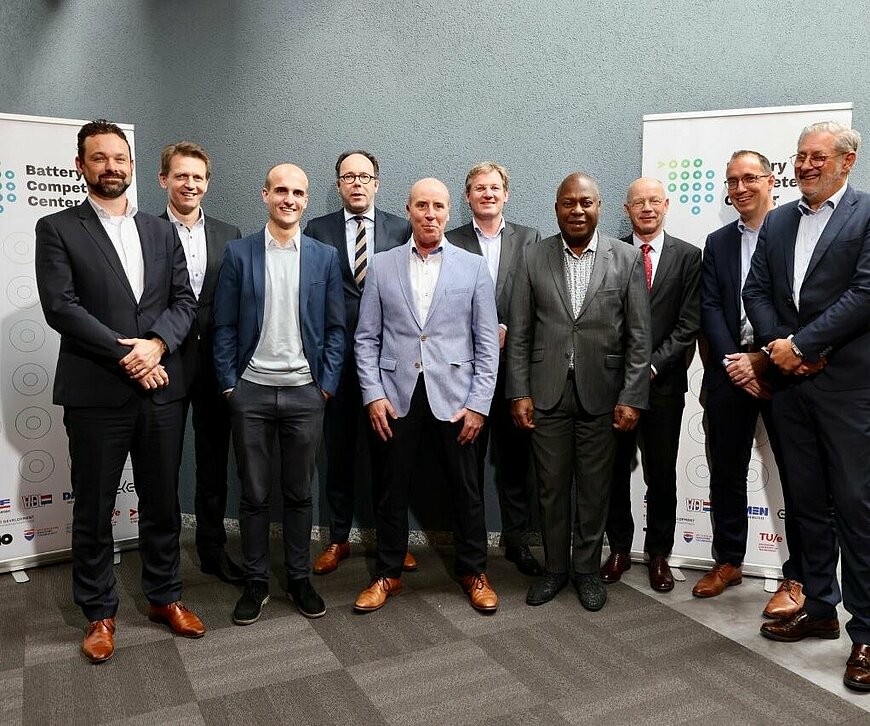Dutch industry joins forces in newly founded Battery Competence Center

Dutch companies, knowledge institutes and industry associations join forces in a new innovation program called Battery Competence Center. In this way, the collaborating parties want to build up knowledge and competences in the field of battery technology and strengthen the competitive position of the Dutch manufacturing industry.
To make the energy transition a success, innovative battery technology is indispensable. The Netherlands has renown companies that are active in the mobility sector, such as DAF Trucks, VDL Groep and Damen Shipyards. These companies are fully committed to electrify their vehicles and vessels. By joining forces with knowledge institutes and promising startups in the field of battery technology and production processes, the Battery Competence Center wants to assemble battery packs in the Netherlands and thus increase the economic opportunities for Dutch Original Equipment Manufacturers (OEM) and startups. A large part of the parties involved in the program as well as innovative startups in battery technology are located in the Brainport Eindhoven region.
Building battery knowledge through unique collaboration
The Battery Competence Center is a unique partnership in which knowledge is shared to work on the development of battery packs for buses, trucks and ships. The partners in the Battery Competence Center combine their knowledge in order to improve the development and production of battery packs in such a way that the vehicle or vessel becomes better and more competitive. The parties are also working together on increasing the purchasing power of the companies. This makes the Netherlands less dependent on foreign suppliers.
The consortium consists of the leading companies DAF Trucks, VDL Groep and Damen Shipyards, startup ELEO Technologies, the knowledge institutes TNO Traffic & Transport and Eindhoven University of Technology (TU/e), economic development agency Brainport Development and industry associations RAI Automotive Industry NL and Netherlands Maritime Technology (NMT).
Battery Packs for Serial Production
In the first project of the Battery Competence Center, the parties work together on developing prototypes of battery packs that they can use in their vehicles and vessels. For example, VDL Groep will use the knowledge to produce battery packs for VDL vehicles. The company has the ambition to build a demo production line for battery packs. “We now use battery packs from Asian suppliers for our electric vehicles,” explains e-mobility specialist Menno Kleingeld of VDL Groep. “To us it is very important that vehicle-specific battery packs are assembled in-house, so that we become more flexible. To achieve this we can use our knowledge in the field of automated serial production lines, as well as our experiences as a user of these battery packs. Ideally, we assemble packages for other companies in addition to our own battery packs.”
In 2018, DAF Trucks was the first major truck manufacturer to introduce a fully electric truck on the market and already has several editions in its delivery program. Jos Habets, Director Operations and member of the Board of Directors: “In the coming years, the demand for fully or partially electric trucks will only increase. In addition, developments in battery technology are developing extremely fast. By combining the knowledge and experience of fellow companies, knowledge institutes and start-ups within the Battery Competence Center, we can further strengthen our competitive position in the field of electric trucks.”
“For Damen Shipyards it is a unique opportunity to apply knowledge from the automotive sector, which is way ahead of the maritime sector in the field of electrification, in the shipping industry,” says Director Group's Research of Damen Shipyards Peter van Terwisga. Startup ELEO develops battery packs for among others industrial vehicles such as excavators, forklifts and tractors. The pilot production line in this project helps ELEO, according to founder Jeroen Bleker; “to start producing on a large scale and to expand our company internationally.”
“The project is supported by the €2.4 million from the REACT-EU subsidy program in collaboration with the province,” says Martijn van Gruijthuijsen, gedeputeerde (Member of the Executive Council) of the province of Noord-Brabant. “This support, in combination with the €2.3 million the participating parties contribute themselves, ensures a strong impact in accelerating and improving battery technology, with which we can make our society and economy a bit more sustainable.”
Long-term strategy to realize ambitions
The Battery Competence Center wants the Netherlands to take an important position in the European battery chain. The Netherlands already has a number of important competencies for taking this position. This includes the development of complex production processes and machines, but also the expertise in the field of thin-film technology and plasma chemistry that is needed to develop a new generation battery cells. The favorable logistics location of the Netherlands in Europe and the strong automotive and maritime industry are important success factors. To capitalize on these opportunities, the Battery Competence Center further develops the ecosystem by setting up multiple collaborative projects, representing and positioning the industry in the national and European playing field and maximizing knowledge sharing within the network.
Operating from the program office on the Automotive Campus, Brainport Development, RAI Automotive Industry NL and NMT, make connections across company borders and involve their network. As a follow-up step, a second project has already been set up for which a subsidy application is currently underway for the R&D Mobility Scheme of RVO. This includes 28 partners from the Dutch automotive and maritime sector who work together in many ways varying from the development, production and application of batteries to recycling. By initiating and facilitating such initiatives, the Battery Competence Center is building a sustainable and strong battery ecosystem in the Netherlands.